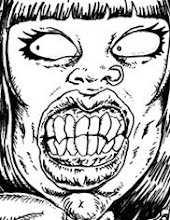Absence is a superb and very unique comic.
Very personal, yet a very educational and informative read, Andy Luke has written an absorbing account of living with epilepsy and how it has impacted on his, and others' lives.
Stephen Downey, has done a great job to make the script visually engaging - using greyscale shading, he manages to create gritty, clear, yet beautiful and sometimes dynamic art, which reminds me a little of the '90s Vertigo era comics styles of Steve Yowell and Sean Phillips.
The comic begins with the recollection of Andy's first episode or 'absence' (see right page)- where as a child, he freezes in the street, much to the concern of his mum. In this milder episode, Andy has no recognition of his temporary absence, and is upset and unnerved by what his mum tells him.
From here the story goes through his early life and condition - starting with being sent to hospital and diagnosed (theres a great couple of panels where the young luke thinks "I'M TRON" whilst hooked up the the ECG glue pads and wires).
There's memories of missing an exam, and a favourite teacher's surprise reaction to his condition, then a fast-forward to Andy's teenage years, studying through college, doing all nighters, out drinking, having the mentality that his condition is "not a problem and shouldn't get in the way of having a normal life".
As he burns the candle at both ends however, and takes a second job, his seizures become more violent.
His memories then flash forward slightly, to a girl who he was smitten with while working as a care assistant in a home for vulnerable adults.
He recounts how she had really bad and frequent seizures, so much so, that she used to wear a riding helmet to protect to her head.
Downey does a great job of illustrating these sequences (click to enlarge the images on the left) and the girl's episode, while Luke explains a little more about what goes on in the brain whilst a seizure occurs, and what others should do if in a situation with someone who is having an episode. And later, he goes into how a sufferer feels after an episode, how draining (physically and emotionally) this can be.
The next stage of the story looks at ways the older Andy took steps to gain greater control over the epilepsy, and how through being open and aware, avoiding triggers, and through looking after his mind and body, Luke managed to avoid having seizures for 11 and a half years ("Before the days of his big crisps habit" as he calls it).
The next few pages of the comic look again, in more detail on how Luke experienced the seizures in the moment, the sensations, the disorientated sense of continuity, of being drawn away or 'bodyjacked' and disassociation from the external 'reality', taken off to somewhere far away.
There's a very sweet and funny segment, where Andy recounts the one person who has been able to 'call him back' consistently, his University neighbour, Hashesh (see above right).
The last few pages look at myths, prejudics and supersitions (in a humorous and slightly sarcastic way) surrounding epilepsy, before finally looking at 'bio feedback''; the gradual process of slowly acquiring voluntary control of an involuntary function, which Luke states is basically the process of learning.
He notes that in his 11 and a half years without violent 'grand mal' seizures, he was learning new skills, studying and accelerating neural pathways in his brain, which is what occurs when we learn (the bridge building metaphor highlights these connections).
He also urges for greater communication between sufferers and witnesses, bringing their perceptions together, which he insists is vital for doctors, patients, and supporters alike.
The comic ends on the idea that epilepsy is not something that the individual affected by it should be intimidated by, that rather, they can to a great extent, take control of their condition, and that they have an exclusive experience and knowledge. This last notion is expressed brilliantly visually, by a slightly mystical montage of the eye and space.
Absence is written and flows in a very natural way, it's never pretentious, it always feels candid, warm and open with moments of humour throughout. What's even better, is that it's completely free! You can read the 20 page comic in it's entirety here
Very personal, yet a very educational and informative read, Andy Luke has written an absorbing account of living with epilepsy and how it has impacted on his, and others' lives.
Stephen Downey, has done a great job to make the script visually engaging - using greyscale shading, he manages to create gritty, clear, yet beautiful and sometimes dynamic art, which reminds me a little of the '90s Vertigo era comics styles of Steve Yowell and Sean Phillips.
The comic begins with the recollection of Andy's first episode or 'absence' (see right page)- where as a child, he freezes in the street, much to the concern of his mum. In this milder episode, Andy has no recognition of his temporary absence, and is upset and unnerved by what his mum tells him.
From here the story goes through his early life and condition - starting with being sent to hospital and diagnosed (theres a great couple of panels where the young luke thinks "I'M TRON" whilst hooked up the the ECG glue pads and wires).
There's memories of missing an exam, and a favourite teacher's surprise reaction to his condition, then a fast-forward to Andy's teenage years, studying through college, doing all nighters, out drinking, having the mentality that his condition is "not a problem and shouldn't get in the way of having a normal life".
His memories then flash forward slightly, to a girl who he was smitten with while working as a care assistant in a home for vulnerable adults.
He recounts how she had really bad and frequent seizures, so much so, that she used to wear a riding helmet to protect to her head.
Downey does a great job of illustrating these sequences (click to enlarge the images on the left) and the girl's episode, while Luke explains a little more about what goes on in the brain whilst a seizure occurs, and what others should do if in a situation with someone who is having an episode. And later, he goes into how a sufferer feels after an episode, how draining (physically and emotionally) this can be.
The next stage of the story looks at ways the older Andy took steps to gain greater control over the epilepsy, and how through being open and aware, avoiding triggers, and through looking after his mind and body, Luke managed to avoid having seizures for 11 and a half years ("Before the days of his big crisps habit" as he calls it).
The next few pages of the comic look again, in more detail on how Luke experienced the seizures in the moment, the sensations, the disorientated sense of continuity, of being drawn away or 'bodyjacked' and disassociation from the external 'reality', taken off to somewhere far away.
There's a very sweet and funny segment, where Andy recounts the one person who has been able to 'call him back' consistently, his University neighbour, Hashesh (see above right).
The last few pages look at myths, prejudics and supersitions (in a humorous and slightly sarcastic way) surrounding epilepsy, before finally looking at 'bio feedback''; the gradual process of slowly acquiring voluntary control of an involuntary function, which Luke states is basically the process of learning.
He notes that in his 11 and a half years without violent 'grand mal' seizures, he was learning new skills, studying and accelerating neural pathways in his brain, which is what occurs when we learn (the bridge building metaphor highlights these connections).
He also urges for greater communication between sufferers and witnesses, bringing their perceptions together, which he insists is vital for doctors, patients, and supporters alike.
The comic ends on the idea that epilepsy is not something that the individual affected by it should be intimidated by, that rather, they can to a great extent, take control of their condition, and that they have an exclusive experience and knowledge. This last notion is expressed brilliantly visually, by a slightly mystical montage of the eye and space.
Absence is written and flows in a very natural way, it's never pretentious, it always feels candid, warm and open with moments of humour throughout. What's even better, is that it's completely free! You can read the 20 page comic in it's entirety here

















